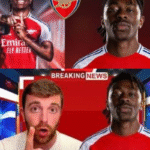Manchester City chairman reveals transfer mistakes and promises new signings before Club World Cup

Manchester City chairman Khaldoon Al Mubarak has issued a decisive statement regarding the club’s immediate transfer plans, acknowledging past mistakes and promising a comprehensive squad overhaul before their participation in the upcoming Club World Cup. In what represents one of the most candid assessments from City’s leadership in recent years, Al Mubarak has committed to “swift” and “very clear” transfer business, with the explicit goal of presenting Pep Guardiola with a transformed squad capable of competing at the highest level.
The Admission of Past Mistakes
The most striking aspect of Al Mubarak’s recent interview, conducted in Abu Dhabi, was his frank admission that the club’s transfer strategy following their fourth consecutive Premier League title had been insufficient. This represents a rare moment of public self-reflection from one of football’s most successful organizations over the past decade.
“I think when I look back, last summer, we probably should have been more aggressive in some of the changes we needed to do. We didn’t do that and that ended up costing us this year,” Al Mubarak stated, providing insight into the internal assessment of City’s disappointing 2024-25 campaign that saw them finish third in the Premier League.
This admission carries significant weight, particularly given City’s recent history of seamless transitions and strategic planning. The chairman’s willingness to acknowledge these shortcomings publicly suggests a fundamental shift in approach and a determination to avoid repeating similar errors. The “cost” he references extends beyond mere league position, encompassing the psychological impact on players, the disruption to established patterns of success, and the potential long-term implications for the club’s competitive edge.
The timing of this admission is particularly poignant, coming immediately after City secured Champions League qualification for the following season with a 2-0 victory over Fulham at Craven Cottage. While this result provided essential relief, it also served as a stark reminder of how close the club came to missing out on Europe’s premier competition for the first time in over a decade.
The Compressed Transfer Timeline
City faces an unprecedented challenge in executing their transfer strategy due to the unique timing constraints imposed by the Club World Cup schedule. The temporary transfer window opens this Sunday and will close just two days before the team departs for the United States on June 12th, creating an extremely compressed timeframe for completing what promises to be extensive business.
This abbreviated window demands a level of preparation and efficiency that even City’s experienced transfer team will find challenging. The club’s hierarchy, including director of football Txiki Begiristain and incoming sporting director Hugo Viana, has been working intensively to identify targets and initiate negotiations well in advance of the window opening.
Al Mubarak emphasized the urgency of the situation, stating: “Our objective is to try to be ready with the new squad for the Club World Cup.” This represents more than mere preference; it constitutes a strategic imperative given the tournament’s prestige and the opportunity it presents for City to establish themselves as genuine global champions.
The logistical complexity of this timeline cannot be overstated. Medical examinations, contract negotiations, work permit applications, and integration training must all be compressed into a matter of days rather than the weeks typically available during regular transfer windows. This constraint places enormous pressure on City’s administrative machinery and may influence their target selection, potentially favoring players with existing relationships or those requiring minimal bureaucratic processing.
Primary Transfer Targets and Strategic Priorities
Tijjani Reijnders: The Midfield Cornerstone
At the center of City’s transfer ambitions lies AC Milan’s Dutch midfielder Tijjani Reijnders, with reports suggesting a fee exceeding £55 million. This represents the club’s most significant financial commitment in the immediate window and signals their prioritization of midfield reinforcement.
Reijnders, who has established himself as a crucial component of Milan’s midfield since his arrival from AZ Alkmaar, offers the technical proficiency and tactical intelligence that Guardiola demands from his central players. His ability to contribute both defensively and in the final third aligns perfectly with City’s systemic requirements, while his age profile suggests he could serve as a long-term successor to aging midfield stalwarts.
The substantial fee reflects both Milan’s reluctance to sell and the premium placed on proven quality in today’s transfer market. For City, securing Reijnders represents more than acquiring talent; it demonstrates their commitment to immediate improvement and their willingness to invest heavily despite previous financial constraints.
Morgan Gibbs-White: The Creative Catalyst
Nottingham Forest’s Morgan Gibbs-White has emerged as another primary target, representing City’s desire to inject creativity and unpredictability into their attacking phases. The England international’s performances for Forest have caught the attention of multiple Premier League clubs, but City’s interest carries particular weight given their track record of developing attacking midfielders.
Gibbs-White’s profile fits perfectly within Guardiola’s tactical framework, offering the versatility to operate in multiple positions while maintaining the technical standards required at the Etihad Stadium. His experience in the Premier League eliminates adaptation concerns, while his age suggests significant room for development under Guardiola’s tutelage.
The pursuit of Gibbs-White also reflects City’s strategy of targeting players with proven Premier League credentials, reducing the risk associated with overseas acquisitions who may struggle with the league’s physical and tactical demands.
Defensive Reinforcements: Full-Back Focus
City’s defensive priorities center on full-back positions, with Wolves’ Rayan Ait-Nouri representing their primary left-back target. The Algerian international’s pace and attacking thrust offer the kind of width that Guardiola’s system demands, while his defensive solidity provides the balance necessary for City’s high defensive line.
On the right flank, City is reportedly considering two options, though specific names remain undisclosed. This dual-track approach suggests either uncertainty about their primary target’s availability or a desire to create competition within the squad. The full-back positions have become increasingly crucial in modern football, and City’s focus on these areas indicates their recognition of defensive width as a tactical priority.
The Florian Wirtz Situation
Perhaps equally significant is City’s decision to withdraw from the race for Bayer Leverkusen’s Florian Wirtz, citing financial considerations. This withdrawal, while disappointing for supporters, demonstrates a newfound fiscal discipline that may reflect lessons learned from previous transfer windows.
Wirtz represents one of European football’s most promising talents, and City’s inability to compete financially for his signature suggests either budget constraints or a strategic decision to allocate resources elsewhere. This development has reportedly opened the door for Liverpool to pursue the German international, potentially strengthening a direct rival while highlighting the competitive dynamics of the modern transfer market.
The decision regarding Wirtz also illustrates the difficult choices facing even the wealthiest clubs in an era of increased financial regulation and inflated transfer fees. City’s withdrawal may reflect a broader strategic shift toward identifying value rather than simply pursuing the highest-profile targets.
Alternative Options and Contingency Planning
Rayan Cherki: The French Connection
Lyon’s Rayan Cherki has attracted City’s attention as an alternative creative option, offering a different profile to other targets. The French youth international’s technical ability and flair provide the kind of unpredictability that can unlock stubborn defenses, though his consistency remains a question mark.
Cherki’s situation at Lyon, where financial pressures may necessitate player sales, could present City with an opportunity to secure a talented player at a reduced fee. This potential bargain aligns with the club’s apparent shift toward more calculated spending while still addressing squad needs.
Goalkeeping Considerations
The potential departure of either Ederson or Stefan Ortega has prompted City to consider Porto’s Diogo Costa as a replacement option. The Portuguese international’s shot-stopping ability and distribution skills align with City’s requirements for a modern goalkeeper, though his acquisition would depend on movement in the current goalkeeping ranks.
This contingency planning demonstrates City’s comprehensive approach to squad management, ensuring readiness for various scenarios while maintaining competitive standards across all positions.
Managerial and Backroom Changes
The transfer activity extends beyond players, with significant changes planned for Guardiola’s backroom staff. The departures of Juanma Lillo, Inigo Dominguez, and Carlos Vicens represent a substantial reshuffling of the technical team, potentially indicating either natural evolution or a desire for fresh perspectives.
These changes, while less visible to supporters, can significantly impact team preparation and tactical implementation. The timing of these departures, coinciding with the playing squad overhaul, suggests a comprehensive organizational refresh designed to rejuvenate the entire football operation.
The integration of incoming sporting director Hugo Viana into these processes adds another layer of complexity, as the former midfielder assumes his new role while simultaneously contributing to immediate transfer decisions. His presence in recent planning meetings indicates his early involvement in shaping City’s strategic direction.
Player Motivation and Squad Dynamics
Al Mubarak’s interviews revealed encouraging signs regarding player mentality following the disappointing season conclusion. His conversations with key players, including Rodri and Erling Haaland, suggest a hunger for redemption that could prove crucial for the coming campaign.
The chairman’s description of players eager to return from vacation early and begin preparation indicates a positive response to adversity. Rodri’s enthusiasm for upcoming fixtures and Haaland’s reluctance to take time off suggest the kind of professional dedication that often precedes successful campaigns.
This psychological aspect cannot be understated in professional football, where confidence and motivation often determine the difference between success and failure. The players’ apparent eagerness to address their shortcomings provides an encouraging foundation for the extensive changes planned.
Financial Implications and Regulatory Considerations
City’s transfer activities must be conducted within the framework of Financial Fair Play regulations and the Premier League’s Profit and Sustainability Rules. The substantial fees being discussed for targets like Reijnders indicate confidence in the club’s financial position, though careful management remains essential.
The club’s recent experiences with regulatory scrutiny make prudent financial management a priority, potentially influencing both the scale and structure of proposed deals. Balancing competitive ambition with regulatory compliance requires sophisticated financial planning and may affect the timeline for certain acquisitions.
The decision to withdraw from the Wirtz pursuit for financial reasons demonstrates this balanced approach, prioritizing long-term stability over short-term gratification. This fiscal discipline, while potentially frustrating for supporters, reflects lessons learned from previous regulatory challenges.
Strategic Implications for Pep Guardiola
The promised squad transformation presents both opportunities and challenges for Guardiola as he prepares for what could be a defining season. The integration of multiple new players requires careful management, particularly given the compressed timeline before competitive fixtures resume.
Guardiola’s recent comments about squad size have been somewhat contradictory, initially requesting more players before suggesting the current group needed streamlining. This apparent uncertainty may reflect the complex balance between quality and quantity that elite managers must navigate.
The successful integration of new signings will depend heavily on Guardiola’s ability to quickly implement his tactical concepts while maintaining team cohesion. His track record suggests confidence in this regard, though the scale of planned changes presents a unique challenge even for his experience.
Club World Cup Significance
The Club World Cup represents more than just another tournament for City; it provides an opportunity to establish themselves as genuine global champions and justify their substantial investments. The tournament’s timing and format create unique pressures that have influenced the entire transfer strategy.
Success in this competition would validate the extensive squad changes while providing momentum for the following Premier League campaign. Conversely, poor performance would intensify scrutiny of both the transfer strategy and Guardiola’s management, making the stakes particularly high.
The tournament also offers a platform for new signings to demonstrate their value quickly, potentially accelerating their integration into the squad. This opportunity may prove crucial for players joining in the compressed timeline before the competition begins.
Long-term Vision and Sustainable Success
Beyond immediate needs, City’s transfer strategy reflects longer-term planning for sustained success. The targeting of players in their prime years suggests a balance between immediate impact and future potential, avoiding the short-termism that has affected other elite clubs.
The acknowledgment of past mistakes and commitment to learning from them indicates organizational maturity and adaptability. This self-awareness, combined with substantial resources, positions City well for both immediate challenges and future competition.
Conclusion: A Pivotal Moment
Manchester City stands at a crucial juncture, with chairman Al Mubarak’s candid assessment and ambitious promises setting the stage for a potentially transformative period. The combination of acknowledged past mistakes, compressed timelines, and substantial financial commitments creates a unique set of circumstances that will test the organization’s capabilities.
The success or failure of this accelerated rebuilding project will significantly influence City’s trajectory for years to come. Al Mubarak’s confidence, the players’ apparent motivation, and the club’s resource availability provide reasons for optimism, though the execution risks remain substantial.
As the transfer window opens, City faces the challenge of translating ambitious words into effective action. The coming weeks will reveal whether the club’s promises align with their delivery capabilities, and whether this period of reflection and reinvestment can restore their position at the pinnacle of English and European football.
The stakes could hardly be higher, with Champions League qualification, domestic success, and global recognition all hanging in the balance. For a club accustomed to setting standards rather than chasing them, this represents both an opportunity for redemption and a test of their fundamental resilience.















